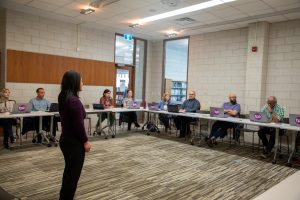Google Canada will provide $13 million to four Canadian organizations providing artificial intelligence (AI) training and skills development across the country through its AI Opportunity Fund, the company announced recently.
Among the four, the Toronto Public Library system will – along with online and in-person AI training programs – also hold its own special live events like an AI exhibition and its first annual AI conference.
Artificial intelligence training and related programming at the country’s largest library system is designed to be free, open, and accessible to its community. Available courses look at many different aspects of artificial intelligence, from its economic potential and workplace impacts to issues of safety, privacy, and ethical responsibility.
Not only Toronto, of course, but right across the country, there’s rising demand for AI knowledge and skills. Google says 63 per cent of workers are interested in developing AI skills, with interest rising to 72 per cent among younger Canadians.
A recent Economic Impact Report from Public First and shared by Google underscores the reason: AI has the potential to boost Canada’s economy by $230 billion.
To help equip people with the skills needed to take full advantage, Google Canada introduced the $13 million AI Opportunity Fund from Google.org, building on other digital and AI upskilling initiatives in this country, like the Google Career Certificates and Grow with Google programs.

Google Canada introduced the $13 million AI Opportunity Fund. Image courtesy Google.
“AI is transforming the way we work and can empower people across almost every field,” said Sabrina Geremia, VP & Country Managing Director for Google Canada, when announcing the Fund at a special event in Toronto. “The AI Opportunity Fund will help upskill Canadians nationwide, strengthen our workforce, and prepare Canadians for an AI-powered economy.”
With plans to reach more than two million people in Canada, the AI Opportunity Fund will support these four initiatives:
- Alberta Machine Intelligence Institute, providing post-secondary students across Canada with foundational AI skills to better adapt to emerging technologies and address the growing AI skills gap in Canada’s workforce.
- First Nations Technology Council, training Indigenous students and providing AI resources to Indigenous community members, with the goal of increasing the number of Indigenous workers in technology.
- Skills for Change will develop foundational AI skills programs to train individuals from communities facing high unemployment.
- Toronto Public Library (TPL) will address the digital divide by launching a city-wide AI upskilling initiative to provide community members with access to free tools, AI skills training and programming to support employment, boost productivity and encourage safe, informed use of AI.
With its 100 branches across the city, and some 46 million annual visits to its physical and online shelves, TPL is not just Canada’s but North America’s largest library system. And it’s long been helping its users explore new technologies as well, running unique hands-on Digital Innovation Hubs and Pop-up Learning Labs.
With ongoing support from Google, TPL is already into a two-year initiative on artificial intelligence, running to the end of next year.

Ab Velasco, Manager of Innovation – AI Services at Toronto Public Library, leads the AI Upskilling Initiative. Image courtesy Google.
Ab Velasco, Manager of Innovation – AI Services at Toronto Public Library, leads the AI Upskilling Initiative, and his team is introducing AI tools and AI literacy programs to branches and communities across the city. TPL is also currently reviewing a short list of approved AI tools, based on its approved AI policy guidelines, and they will be unveiled this fall.
One component of the AI initiative is the AI Essentials Learning Circle, Velasco described. Through virtual and in-person learning circles (which are like study groups), students are guided through the Google AI Essentials course delivered via the Coursera online learning platform.
The four-week program is led by a qualified librarian, and while in-person classes are generally kept to around 15 people, online courses can be expanded somewhat, Velasco said, adding that the groups or cohorts are often full (seven are underway currently) and represent a wide cross-section of the community.

AI Learning Circles bring together a wide cross-section of the community. image courtesy TPL.
“It’s fun to see the kinds of users that are in these Learning Circles. There are the young professionals, looking to upskill. They’re from HR, from marketing, from the creative arts. There are teachers and professors. We also have retirees, all looking to learn more about AI and how it’s going to change the world.”
TPL is also collaborating with recognized experts in AI as it conducts four separate Innovator-in-Residence programs this year and next.
“These short residencies at branches across the city will focus on specific aspects of AI,” Velasco explained. “This fall, we’ll launch a twelve-week residency on ‘AI and Digital Creativity’. We know AI is not without risk, and we hope our resident will bring a balanced and thoughtful program about creativity and artificial intelligence.”
Velasco added that the resident has just been hired, and TPL will make further announcements later about this and other AI residencies.
He did confirm that TPL will be holding major live events later this year, including another Digital Expo (TPL’s blend of online and in-person programs about artificial intelligence, digital privacy, digital content creation and related topics) and a new ‘AI Summit’, the first of a planned annual series of AI-focused conferences!
“It’s a new curated conference, representative of the public library experience,” Velasco said.
Free and accessible for members of the community, the event will bring together academics, technologists, representatives from government and not-for-profit groups. They’ll discuss and demonstrate how AI is transforming the local and Canadian economy and how we work in it.
What is clear now in all of TPL’s AI training and upskilling activities is Velasco’s stated conviction that the most important goal is to encourage the safe and informed use of artificial intelligence.
His approach to training is to be transparent about the risks – privacy, safety, environmental, even hallucinogenic – while pursuing the benefits.
“Along with educating people around safe and responsible practices, we stress in our programs, like the Learning Circles, to always ‘keep the human in the loop’. We encourage students to be transparent about the use of AI tools, for learners to be responsible and to vet the accuracy and appropriateness of their output.”
# # #

Google Canada will provide $13 million to four Canadian organizations providing artificial intelligence (AI) training and skills development across the country, including TPL (the Toronto Public Library). Image courtesy Google.
-30-



